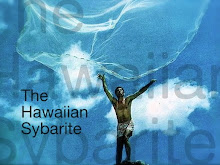
We at The Hawaiian Sybarite find much to admire in Antônio Carlos Jobim—Tom Jobim to us. We admire him for essentially creating bossa nova, together with João Gilberto and Vinicius de Moraes in Rio de Janeiro in six short years from 1958, the year when everything happened, as far as we're concerned. We admire him for leaving us with a songbook of jazz standards that includes "A Felicidade," "Agua de Beber," "Corcovado," "Desafinado," "One Note Samba," "Wave," and his valentine to Cariocas, "The Girl from Ipanema."
Above all else, we admire him for being a romantic.
"My work is all a song of love to Brazil, my land, people, flora and fauna—from the sight of my window or the window of the airplane."
Jobim studied architecture and even worked in an architect's office, but quickly realized that he'd much rather be spending his days playing the piano than sweeping eraser dust from his drafting table. A life of quiet fulfillment through rationality wasn't for him. (As an aside, we at The Hawaiian Sybarite have found ourselves in the same situation—except that we can't read music—and Jobim's life gives us hope that we may one day be called to the greatness that awaits us.)
Jobim began his career as a professional musician by performing in bars and clubs during the early 1950's in Copacabana. It was in these bars that his unique talent as a musician was recognized and he was signed to a record company where he was first employed to arrange other artists' work. Gradually he became a more active composer, performer and recording-artist, and the result was bossa nova.
When speaking of the outstanding albums of Tom Jobim's catalogue, we're embarrassed for choice, but 1967's "Wave" is our personal favorite.
"Wave" is much too short at just over 30 minutes. Not that the album doesn't contain track after track of masterful tone-poems, we'd simply like the album to continue indefinitely. If there was ever a soundtrack for the days when a black cloud is stationed over your head, this is it.
An album to be savored in its entirety, we suggest listening to it while relaxing supine at sunset with a caipirinha close at hand. While doing so, keep an ear open for title track "Wave," as well as "Batidinha," and "Triste."
"Wave" is much too short at just over 30 minutes. Not that the album doesn't contain track after track of masterful tone-poems, we'd simply like the album to continue indefinitely. If there was ever a soundtrack for the days when a black cloud is stationed over your head, this is it.
An album to be savored in its entirety, we suggest listening to it while relaxing supine at sunset with a caipirinha close at hand. While doing so, keep an ear open for title track "Wave," as well as "Batidinha," and "Triste."
"Wave" seizes the relaxed joy of Brazil but just underneath the surface, it also captures the wistful recognition that this world can be a dark place, and there may be a light some place, but you don't know where.
What makes the Brazilian personality and particularly the outlook of Cariocas so admirable is their seemingly effortless ability to both recognize their own suffering and then choose to forget it. There may be potentially terminal catastrophes. The planet is in peril. There is exploitation and sadism and abuse and indifference, but Brazilians are going to carry on having a good time in spite of the misery around them.
What makes the Brazilian personality and particularly the outlook of Cariocas so admirable is their seemingly effortless ability to both recognize their own suffering and then choose to forget it. There may be potentially terminal catastrophes. The planet is in peril. There is exploitation and sadism and abuse and indifference, but Brazilians are going to carry on having a good time in spite of the misery around them.
Those from the sober north may often consider this philosophy at best Dionysian and at worst, infantile and superficial. In his inimitable manner, Jobim answered that criticism.
"This is a country that prostitutes enjoy, where the dealers snort and where a used car is worth more than a new car. Is this or is this not a country standing on its head? Brazil is standing on its head, and if you say it's standing on its head, then put your head upside down, you see that it's head up."
"Wave" is available from iTunes, and is available in both mp3 and CD format from amazon.com, but for the most authentic experience, we at The Hawaiian Sybarite highly recommend the vinyl release of "Wave," also availble from amazon.com.
Additional stockists include:
Barnes & Noble Booksellers Ala Moana Mall, 1450 Ala Moana Blvd. Suite 1272, Honolulu Hawaiʻi, (808) 949-7307



No comments:
Post a Comment